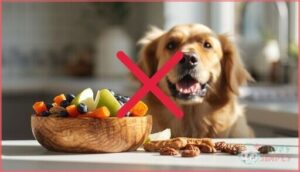This site is supported by our readers. We may earn a commission, at no cost to you, if you purchase through links.
Your dog just snagged a pecan off the counter, and you’re wondering if you need to panic. The short answer: yes, pecans are dangerous for dogs. Unlike some nuts that cause only mild upset, pecans pack a triple threat—natural toxins, mold-producing compounds, and enough fat to trigger serious digestive problems.
Even a few nuts can send your dog to the emergency vet with symptoms ranging from vomiting to seizures. The good news? Most cases are preventable when you know what signs to watch for and how to respond quickly. Understanding the specific risks pecans pose helps you protect your dog from unnecessary suffering and expensive vet bills.
Table Of Contents
- Key Takeaways
- Can Dogs Eat Pecans?
- Why Pecans Are Unsafe for Dogs
- Health Risks Pecans Pose to Dogs
- Symptoms of Pecan Ingestion in Dogs
- What to Do if Your Dog Eats Pecans
- Veterinary Diagnosis and Treatment
- Preventing Pecan Poisoning in Dogs
- Safe Alternatives to Pecans for Dogs
- Frequently Asked Questions (FAQs)
- Conclusion
Key Takeaways
- Pecans are toxic to dogs due to juglone (a natural compound), tremorgenic mycotoxins from mold, and extreme fat content that can trigger life-threatening pancreatitis even from small amounts.
- Symptoms of pecan poisoning range from vomiting and diarrhea within 2-12 hours to neurological signs like tremors and seizures, with small dogs facing the highest risk per body weight.
- If your dog eats pecans, call your vet immediately—don’t induce vomiting without professional guidance, and watch for emergency signs like repeated vomiting, tremors, or bloody diarrhea that require urgent care.
- Prevention is straightforward: store pecans in airtight containers on high shelves, clean up fallen nuts from pecan trees daily, and offer safe alternatives like plain carrots, seedless watermelon, or unsalted peanuts in tiny portions.
Can Dogs Eat Pecans?
No, dogs shouldn’t eat pecans. While these nuts pack a nutritional punch for humans, they’re firmly in the “don’t feed” category for your canine companion. Veterinarians and pet poison centers classify pecans alongside walnuts as higher-risk nuts for dogs—much more dangerous than the occasional plain peanut or cashew.
For a complete breakdown of the specific dangers pecans pose to dogs, check out this guide on whether dogs can safely eat pecans.
The trouble isn’t just about pecan toxicity in dogs from natural compounds like juglone; it’s also the mold risk, high fat content, and potential for serious illness. Even one or two small pieces might pass through without obvious symptoms, but there’s no officially safe amount recommended for routine feeding.
Regarding toxic nuts for dogs and overall pet safety, pecans belong on the “keep away” list to protect canine health and dog nutrition. Because pecans also pose increased risks due to, it’s safest to avoid them entirely.
Why Pecans Are Unsafe for Dogs
Pecans might seem harmless, but they carry several hidden dangers that can seriously harm your dog. From toxic compounds and digestive hazards to contamination risks, these nuts pose multiple threats to canine health.
Here’s what makes pecans so risky for your four-legged friend.
Juglone Content and Toxicity
Pecans contain juglone, a toxic compound that harms dogs even in small amounts. This nut toxin irritates your dog’s digestive tract, triggering vomiting, diarrhea, and abdominal pain within hours of canine exposure. While juglone levels won’t usually hurt you, your dog’s sensitivity makes pecan poisoning a real threat.
Larger exposures can cause severe pecan toxicity in dogs, potentially becoming life-threatening without veterinary care. Pet owners should familiarize themselves with to better protect their dogs from accidental ingestion.
High Fat Content and Pancreatitis Risk
Beyond juglone, your dog faces another serious threat from pecans: their extreme fat content. Pecans pack roughly 88 percent of their calories as fat, meaning even a small handful can overload your dog’s pancreas. This fat metabolism challenge triggers pancreatitis, a painful inflammation that can turn life-threatening fast.
Here’s what happens when high fat content meets your dog’s digestive system:
- Sudden enzyme surge – Your dog’s pancreas must release a flood of digestive enzymes to break down the fatty acid load at once.
- Overwhelmed organ – The pancreas becomes irritated and inflamed while struggling to keep up with the dietary trigger.
- Extended stress – High fat foods slow stomach emptying, keeping the pancreas stimulated longer than normal.
- Lowered threshold – Repeated fatty snacks make future pancreatitis episodes more likely, especially in breeds like Miniature Schnauzers.
Small dogs and overweight pets face even higher risk because a few pecans represent a massive fat dose relative to their body weight. If your dog has had pancreatitis before, pecans fall firmly into the “never feed” category for canine pancreatitis management and dog health and nutrition.
Proper nutrient balance and understanding pancreas function help you avoid these dangerous dietary triggers entirely.
Mold and Mycotoxin Dangers
Even more dangerous than pancreatitis are the invisible molds that thrive on pecans stored in warm, humid spots. These fungal growths produce tremorgenic mycotoxins like penitrem A, which trigger sudden seizures, whole-body tremors, and vomiting in dogs within hours.
Moldy pecans produce tremorgenic mycotoxins that trigger seizures, tremors, and vomiting in dogs within hours
Small-breed dogs face the highest toxicity levels because a single moldy pecan delivers a massive dose per pound. Proper nut storage and mold prevention become essential when curious pets roam your home.
Choking and Intestinal Blockage Hazards
A whole pecan can lodge in your dog’s throat and block airflow completely—especially risky for small breeds whose airways match the nut’s size.
If swallowed, it may wedge in the esophagus or create an intestinal blockage downstream, cutting off blood flow and requiring emergency surgery.
Sharp shell fragments increase gastrointestinal damage, scraping delicate tissue and worsening obstruction risks.
Health Risks Pecans Pose to Dogs
When your dog eats pecans, the problems can range from mild stomach trouble to serious medical emergencies. The severity depends on how much they ate, whether the nuts were moldy, and how sensitive your dog’s system is.
Let’s look at the three main health risks pecans create for dogs.
Gastrointestinal Upset
When your dog raids the nut bowl, stomach irritation often strikes first. The high fat content in pecans triggers gut inflammation, leading to vomiting and diarrhea within hours. Here’s what gastrointestinal upset from nut allergies or pecan-related food poisoning looks like:
- Repeated vomiting with partially digested nut pieces
- Loose, greasy stools that smell worse than usual
- Abdominal pain shown by whining or hunching
- Complete loss of appetite lasting 24-48 hours
These digestive issues can quickly escalate to pancreatitis if your dog ate multiple pecans.
Neurological Symptoms
The most alarming toxicity effects emerge when moldy pecans introduce tremorgenic mycotoxins into your dog’s system. Within hours, you’ll notice neurological symptoms like violent tremors that won’t stop, muscle twitching, and disorientation.
Seizures can follow, signaling brain inflammation and potential neurological damage. Without quick seizure control, toxic exposure may delay neural recovery or cause lasting harm.
Pancreatitis and Organ Damage
When your dog raids that bowl of pecans, the high fat content can trigger pancreatitis within hours. Pancreatic inflammation unleashes digestive enzymes that attack the organ itself, causing severe pain and cell death.
In serious cases, leaking enzymes spark systemic infection and organ failure—kidneys, liver, and lungs can all shut down. Moldy pecans add another layer of toxic risk, causing gastrointestinal damage and liver dysfunction that demand emergency care.
Symptoms of Pecan Ingestion in Dogs
If your dog gets into pecans, symptoms can show up anywhere from a few minutes to several hours later, depending on how much they ate and whether the nuts were moldy.
Some signs are mild and digestive-related, while others point to more serious neurological or organ issues. Here’s what to watch for after pecan ingestion.
Vomiting and Diarrhea
If your dog swipes a pecan from the counter, vomiting and diarrhea often appear within two to twelve hours as juglone and high fat irritate the digestive tract. You may notice partially chewed nut pieces mixed with yellow bile, followed by loose or watery stool that looks oily and smells foul.
These gastrointestinal issues signal stomach upset and possible food poisoning from toxic foods for dogs like pecans, especially if the nutritional hazards include mold or excess fat overload.
Lethargy and Loss of Appetite
After vomiting subsides, your dog may become unusually tired, refusing even favorite treats—classic lethargy signs paired with appetite loss that often appear within hours of pecan toxicity. This canine weakness can escalate quickly if pancreatitis develops from the nuts’ high fat, so watch for:
- Sleeping most of the day instead of greeting you
- Ignoring food bowls or sniffing meals and walking away
- Moving slowly or hesitating to stand
If lethargy and appetite loss persist beyond 24 hours or worsen alongside ongoing vomiting, emergency care is critical.
Tremors, Seizures, and Shaking
Beyond fatigue, pecan poisoning can trigger neurological symptoms—muscle tremors, shaking, even full seizures—especially if moldy pecans contain tremorgenic mycotoxins. You might notice fine tremors in your dog’s legs or jaw quivering that worsens with noise or touch.
These seizure triggers demand an emergency response: call your vet immediately, since sustained shaking can escalate to convulsions and life-threatening complications within hours.
Abdominal Pain and Bloating
Your dog’s belly might feel tight or drum-like after eating pecans—abdominal discomfort signals gut irritation from the nuts’ high fat content or stomach inflammation from mold.
Watch for bloating causes like trapped gas, pancreatitis, or even intestinal blockage if shell pieces were swallowed.
Belly distension paired with restlessness or whining means gastrointestinal upset is progressing, and you need veterinary help fast.
What to Do if Your Dog Eats Pecans
If your dog gets into pecans, staying calm and acting quickly makes a real difference. The right response depends on how much they ate, whether the nuts were moldy, and what symptoms you’re seeing.
Here’s what you need to know to keep your dog safe and when to get help.
Immediate Steps to Take
The moment you realize pecans have vanished from the counter, your first priority is pet safety. Quick, calm action makes all the difference in an emergency response to pecan ingestion.
- Confirm what and how much was eaten – check packaging for mold, chocolate, or xylitol mixed in.
- Remove access – pick up remaining nuts and move your dog away from the area.
- Watch for toxicity signs – monitor for vomiting, diarrhea, tremors, or seizures within the first few hours.
- Gather details – note the time, amount, and any symptoms to share with your veterinarian for urgent care guidance.
When to Call The Veterinarian
After you’ve gathered the details, it’s time to decide whether a vet consultation is necessary. Some situations demand urgent care, while others allow brief home monitoring. Use this table to guide your decision and protect canine health and safety.
| Situation | Severity | Action |
|---|---|---|
| Small dog ate one whole pecan | Moderate | Call your veterinarian for guidance |
| Vomiting lasts over two hours | High | Contact emergency vet immediately |
| Tremors or seizures appear | Critical | Seek veterinary emergency care at once |
| Musty or moldy pecans consumed | High | Call poison control or vet right away |
| Mild soft stool persists beyond one day | Moderate | Schedule vet consultation for evaluation |
Emergency signs like tremors, bloody diarrhea, or repeated vomiting signal dog toxicity that requires immediate professional help. Don’t wait if your pet shows neurological symptoms—mycotoxin exposure escalates fast. Even if toxicity levels seem low, puppies, seniors, and dogs with pre-existing conditions tolerate pet poisoning poorly and decline quickly.
Should You Induce Vomiting?
Should you grab hydrogen peroxide and try to make your dog throw up? Hold on—inducing vomiting isn’t always safe. Veterinary guidance comes first, because the wrong move can cause aspiration pneumonia or make toxicity levels worse.
- Vomiting only works within two hours of eating pecans, before they leave the stomach
- Brachycephalic breeds and lethargic dogs face higher vomiting risks from choking on vomit
- Emergency procedures require professional dosing—never use salt, mustard, or dish soap
Veterinary Diagnosis and Treatment
When your dog eats pecans, your vet will need to figure out how serious the situation is and what treatment makes sense. The approach depends on how much your dog ate, whether the nuts were moldy, and what symptoms are showing up.
Here’s what usually happens during diagnosis and treatment.
How Vets Assess Pecan Toxicity
When your dog eats pecans, your veterinarian starts with a toxicity screening to determine the risk. They’ll ask exactly what and how much your pup ate, check vital signs, and palpate the abdomen for pain or bloating.
Blood tests measure pancreatic enzymes and organ function, while a neurologic exam catches tremors or weakness from nut poisoning—giving a complete veterinary assessment before emergency response begins.
Emergency Treatment Protocols
Once your veterinarian completes the toxicity assessment, emergency response unfolds fast. If your dog ate pecans recently, they’ll induce vomiting using injectable drugs, then administer activated charcoal to bind remaining toxins.
Stabilization techniques include IV fluids, anti-nausea medications, and oxygen support if breathing becomes labored. Dogs showing tremors from mycotoxins receive anticonvulsants, while suspected pancreatitis cases get pain relief and continuous veterinary emergency protocols monitoring.
Estimated Costs of Care
Emergency fees for same-day visits start around $100 to $200, with after-hours surcharges adding another $75 to $150. Diagnostic costs — bloodwork, X-rays, ultrasounds — usually run $150 to $900 depending on what’s needed.
Hospitalization expenses for pancreatitis can reach $1,500 to $5,000 for severe cases.
Pet insurance often reimburses 70 to 90 percent after your deductible, making financial planning essential for emergency pet care.
Preventing Pecan Poisoning in Dogs
Once you know the risks, the best approach is simple: keep pecans away from your dog. A few practical changes around your home can go a long way in preventing accidental ingestion.
Let’s look at three key areas where you can take action.
Safe Storage and Cleanup
The best defense against pecan poisoning starts with airtight storage tips and smart yard cleanup methods. Keep your pecans sealed in hard containers—high shelves work wonders—and sweep your kitchen floor right after spills. If you’ve got pecan trees, daily walks with a nut rake prevent mold from turning fallen nuts into toxic foods.
- Lock down pecan container safety with childproof latches on pantry doors
- Boost trash can security using step-pedal lids dogs can’t knock over
- Master kitchen spill response by vacuuming fragments and wiping greasy residue immediately
- Prioritize pet safety through vigilant yard cleanup methods during nut drop season
Educating Family and Visitors
Ever noticed how a “no human food” sign on your fridge can spark Visitor Awareness? Clear Household Rules and quick chats about Pet Safety make Family Education easy.
Guest Etiquette matters—remind everyone that pecans and other Toxic Foods aren’t safe nuts for dogs. Sharing a printed list or vet flyer keeps Dog Safety top of mind for Pet Care and Safety.
Supervising Dogs Around Food
Once everyone’s on board with no-pecan rules, it’s time to watch your dog during meals. Block kitchen access with baby gates when you’re cooking—that stops counter surfing before it starts. Keep your dog on a mat or in another room while you eat, then sweep floors right after.
Teaching “leave it” during walks near pecan trees adds another layer of Nut Toxicity protection for Pet Care and Safety.
Safe Alternatives to Pecans for Dogs
The good news is that plenty of safe, nutritious options can satisfy your dog’s craving for a crunchy snack. From fresh fruits and vegetables to carefully selected nuts and seeds, you have healthier choices that won’t put your pet at risk.
Let’s look at some dog-friendly alternatives that deliver flavor and nutrition without the dangers pecans bring.
Dog-Friendly Fruits and Vegetables
Unlike pecans, many fresh fruit options and vegetables make excellent healthy snack choices that align with sound pet nutrition advice. Seedless watermelon, crisp apple slices without cores, and plain carrot sticks offer safe food lists backed by solid canine diet planning.
These alternatives won’t trigger pancreatitis in dogs and deliver vitamins without the risks pecans carry, giving you reliable nutrition advice for dogs while supporting pet safety and care.
Nuts and Snacks That Are Safe
While most nuts carry risks, plain unsalted peanuts and cashews can serve as occasional treats when shelled and given in tiny portions. Almonds, hazelnuts, and walnuts present choking and digestive concerns, so skip those entirely.
For nut-free options supporting healthy snacking, plain air-popped popcorn or small rice cake pieces follow dog treat guidelines without the fat-heavy concerns pecans bring.
Commercial Dog Treat Recommendations
Instead of pecans, choose treats with clear ingredient lists free of tree nut mix or pecan meal. Look for “no nuts” or “allergy friendly” labels that match your dog’s needs.
Limited ingredient options using single proteins like chicken or fish support healthy snacking while following pet food regulations.
Brands highlighting nut-free options prioritize canine wellness and medicine, offering safer paths to healthy treats for dogs through careful ingredient safety standards.
Frequently Asked Questions (FAQs)
What nuts are poisonous to dogs?
Macadamia nuts top the danger list—they’re highly toxic and trigger weakness and tremors. Black walnuts contain juglone, while moldy pecans and walnuts harbor mycotoxins that cause seizures. Horse chestnuts are extremely poisonous too.
Can dogs eat pecan trees?
No, pecan trees pose serious risks to dogs. All tree parts contain juglone, causing vomiting and neurological symptoms.
Pecan shells create choking hazards, while mold produces mycotoxins triggering seizures, making yard safety essential.
Are pecans healthy snack?
For humans, yes—pecans deliver heart-healthy fats, magnesium, and potassium. But for dogs, they’re risky. High fat triggers pancreatitis, juglone irritates digestion, and mold produces dangerous mycotoxins.
Can dogs eat pecan pie?
No, pecan pie is dangerous for your dog. The combination of toxic pecans, mycotoxins, and sky-high fat levels can trigger vomiting, tremors, or pancreatitis—requiring emergency vet response immediately.
Are pecans poisonous to dogs?
Many pet owners toss nuts to their dogs, thinking they’re harmless. But pecans pack a triple threat of juglone toxicity, dangerous molds, and pancreatitis-triggering fats that make them genuinely poisonous to canines.
Can dogs eat pecan husks?
No, husks are dangerous. They carry juglone and attract mold that produces tremorgenic mycotoxins, causing neurological symptoms in dogs.
Sharp edges also pose choking and intestinal blockage risks, making yard cleanup essential for pet safety.
What happens if a dog eats a pecan?
When your dog swallows even one pecan, juglone and high fat content can trigger vomiting, diarrhea, and abdominal pain within hours.
Meanwhile, mold exposure may cause tremors or seizures requiring emergency veterinary care.
What happens if my dog eats pecans?
If your dog eats pecans, watch for vomiting, diarrhea, tremors, or lethargy within hours.
Contact your veterinarian immediately if symptoms appear, especially shaking or abdominal pain—these signal pecan toxicity requiring emergency care.
What nuts are toxic to dogs?
Macadamia nuts top the toxic nut list, causing weakness and tremors. Black walnuts trigger neurological symptoms, while moldy tree nuts expose pets to mycotoxins. Pistachios risk pancreatitis and blockages—serious canine health risks.
Can dogs eat pecans and almonds?
An ounce of prevention is worth a pound of cure. Neither pecans nor almonds belong in your dog’s bowl—pecan toxicity and nut toxicity risks include digestive upset, choking, and pancreatitis, while almonds cause food allergen concerns.
Conclusion
Keeping pecans away from your dog isn’t about living in fear—it’s about stacking the deck in your favor. Now you know the answer to “can dogs eat pecans” is a firm no, backed by real risks like toxins, mold, and pancreatitis.
Store nuts securely, act fast if your dog sneaks one, and stick to safer treats. A little vigilance today means fewer emergency vet visits tomorrow. Your dog’s health is worth that trade-off.

















